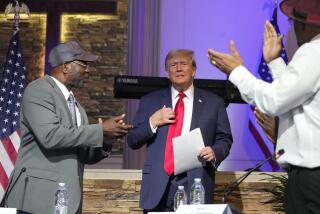Bush Delivers Message of Inclusion
DEARBORN, Mich. — President Bush shifted his focus Monday from the war with Iraq to that nation’s reconstruction, telling hundreds of Arab Americans that U.S. officials -- while working to create a democracy in the country -- have “no intention of imposing our form of government or our culture.”
At the same time, Bush said, Iraq’s government will be one in which “all Iraqis have a voice ... and all citizens have their rights protected.”
Bush’s message of inclusion and self-rule seemed aimed in part at skeptics, both in the United States and abroad, who have questioned his administration’s motives in overthrowing the regime of Saddam Hussein.
“Whether you’re Sunni or Shia or Kurd or Chaldean or Assyrian or Turkoman or Christian or Jew or Muslim -- no matter what your faith -- freedom is God’s gift to every person in every nation,” Bush said. “As freedom takes hold in Iraq, the Iraqi people will choose their own leaders and their own government.”
The president’s remarks were telecast by satellite stations throughout the Arab world.
His comments also came amid spirited jockeying for power in Iraq, even before a U.S.-backed transitional authority is established. A second meeting on forming such an authority took place in Baghdad on Monday.
While the details are being ironed out, U.S. forces generally are giving a wide berth to increasingly assertive Shiite religious leaders while cracking down on others who have tried to fill the power vacuum. On Sunday, U.S. soldiers arrested a self-proclaimed mayor of Baghdad.
The gathering in Dearborn took on the air of a victory rally, as about 500 Arab Americans in the Ford Community and Performing Arts Center gave Bush a thunderous welcome. Repeatedly, they interrupted his remarks with standing ovations and chants such as, “We love Bush” and “U.S.A.”
After concluding his address by saying, “Long live a free Iraq,” Bush turned and planted a kiss on each cheek of Imam Sayed Hassan al Qazwini, who immigrated to the U.S. in 1992 after some family members were killed, allegedly by Hussein’s regime.
Yet the elation belied concerns about U.S. intentions and conduct that have been expressed by some residents of Dearborn, which has one of the nation’s largest concentrations of Arab Americans.
The president’s visit also served as a fresh reminder of the difficult task facing the United States as it seeks to remake Iraq into a democracy. As early as this Thursday, while visiting the aircraft carrier Abraham Lincoln off the coast of San Diego, Bush might declare an end to the combat phase of the war. But he warned Monday that winning the war was not an end in itself.
“The work of building a new Iraq will take time. That nation is recovering not just from weeks of conflict, but from decades of totalitarian rule,” Bush said.
Playing to the fiercely anti-Hussein expatriate crowd, he also ridiculed the ousted Iraqi leader for enriching himself at the expense of his people. He recited a list of complaints against Hussein that ranged from building lavish palaces to owning “gold-covered AK-47s.”
But things are on the mend, Bush said. “He’s gone. Day by day, hour by hour, life in Iraq is getting better.”
In a separate round-table discussion with 17 Iraqi Americans, Bush brought up a widely expressed concern about the failure of U.S. troops to protect the treasure-filled museums in Baghdad from looters.
“I’ve heard this ridiculous claim that we were more interested in protecting oil fields than museums,” he said. Bush dismissed the claim, noting that troops quickly and easily reached the oil fields in the south but that when they arrived in Baghdad, the situation was more chaotic.
In his speech, the president vowed to help Iraqi authorities bring the looters to justice.
The only overt disagreement during the discussion arose when Dr. Asad Khailany, a Sunni Kurd, made a case for dividing Iraq into three autonomous regions.
When Tarik Daoud, identified by the White House as an Arab Christian, began to object, Bush cut off the debate, though with a smile.
“We’re not going to have a debate on the form of the government,” he said. “This debate is going to take place in Iraq.”
At another point, Bush mentioned that he was aware of “the left-wing babble” that the war’s real aim was to give the United States control of Iraqi oil fields. “Forget it,” he said. “The oil is the Iraqi people’s oil.”
He also renewed his call on the United Nations to lift economic sanctions against Iraq. That issue remains under debate at the U.N.
Monday was Bush’s ninth presidential visit to Michigan, which is a crucial battleground in elections. In 2000, Al Gore defeated Bush in Michigan, 51% to 46%.
More to Read
Sign up for Essential California
The most important California stories and recommendations in your inbox every morning.
You may occasionally receive promotional content from the Los Angeles Times.










